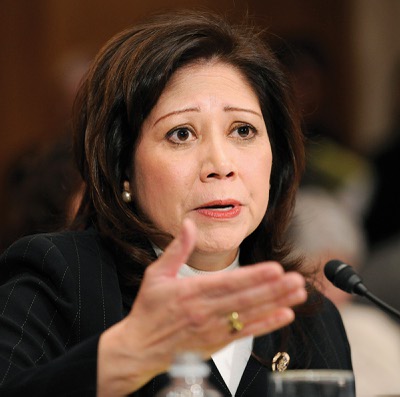Sunday, July 26, 2009 | 2 a.m.
Download report (.pdf)
Sun Coverage
Sun Blogs
Labor Secretary Hilda Solis quietly announced two actions last week that could have far-reaching effects on workers and Wal-Mart, the country’s largest private employer.
First, Solis boasted of a hike in the federal minimum wage.
She followed up with news that her department will hire 250 investigators this year to enforce wage-and-hour laws — a dire necessity according to a new report by the Government Accountability Office, which found the Labor Department had failed thousands of wage theft victims.
Solis made it clear the hires were intended to send a message: Government will no longer tolerate labor law abuse.
The actions presage a day of reckoning for Wal-Mart, according to a new book by labor historian Nelson Lichtenstein. “The Retail Revolution: How Wal-Mart Created a Brave New World of Business” traces the retailer’s rise out of the rural South, changing the way business is done and creating a new economic order. As Lichtenstein notes, Wal-Mart’s success is due in part to a corporate culture that squeezes managers and workers alike, putting a premium on “off-the-clock” work.
In December, the retailer settled 63 wage-and-hour lawsuits, many originating in Las Vegas and filed in Nevada, accusing it of systematically cheating employees out of hours they had worked. Specifically, the class-action complaint alleged store managers engaged in a practice known as “time shaving,” clocking employees out one minute after their meal breaks ended — even though they worked for several hours afterward — and erasing overtime from their time cards.
Former CEO Lee Scott has blamed the abuses on a bunch of “knuckleheads,” managers acting illegally without the knowledge of corporate headquarters, and the company’s general counsel has said the allegations in the lawsuits are “not representative of the company we are today.”
But Lichtenstein argues that raising the minimum wage and cracking down on wage-and-hour abuses, in addition to other Obama administration initiatives, attack the core of the Wal-Mart business model. The changes, he writes, will result in increased labor costs, reducing a significant advantage it enjoys over other retailers and grocers.
That advantage changed the business landscape in Las Vegas in the 1990s, when the retailer opened 16 stores here. According to Lichtenstein, Wal-Mart’s rise in Southern Nevada led to the collapse of Raley’s, a unionized California-based grocery chain. All of its 18 supermarkets in Southern Nevada were shuttered by 2002.
The United Food and Commercial Workers Union tried to fight back, mounting an organizing campaign in a few spots across the country, with union-friendly Las Vegas as its focus. Lichtenstein says a Wal-Mart manager-turned-union organizer found the conditions at stores here ideal for unionization: violent shoplifters, alienated associates and sky-high turnover.
Wal-Mart responded aggressively though, and the campaign failed.
Even the union’s attempt to get the National Labor Relations Board to impose a serious companywide penalty came up short when Wal-Mart used its juice to appeal to the Bush administration.
But the political winds have changed, and now the company faces legislation that would make it easier for workers to organize. The retailer, not surprisingly, is a fierce opponent.
And yet Wal-Mart is on board with President Barack Obama’s push for health insurance reform. CEO Michael Duke joined with Andy Stern of the Service Employees International Union and John Podesta, who managed Obama’s transition, in a letter to the president last month expressing support for an employer mandate.
The move, denounced by the Chamber of Commerce and the National Retail Federation, is surprising for a company often criticized for insuring slightly more than half of its 1.4 million employees, many of whom are enrolled in Medicaid or other public health programs.
In an interview, Lichtenstein said the retailer is coming to terms with new political and economic realities.
Faced with rising labor costs, both domestic and foreign, and a stagnant stock price, the retailer has little choice, he said.
“What had made Wal-Mart successful, its claim to fame, is diminishing,” he said. “It’s a different kind of animal now. They are changing the way they do business, to some extent.”


Join the Discussion:
Check this out for a full explanation of our conversion to the LiveFyre commenting system and instructions on how to sign up for an account.
Full comments policy